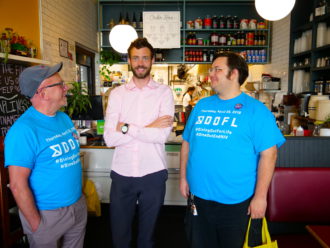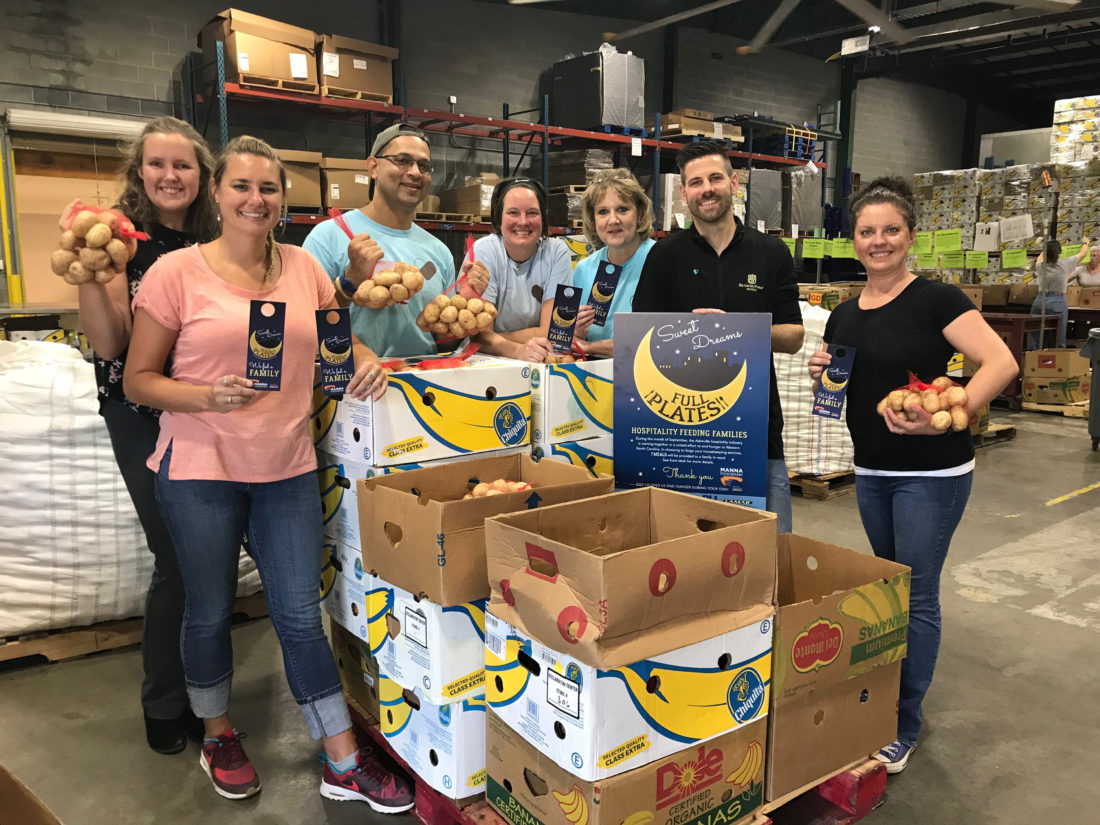Eat. Play. Shop. Park. Sleep. Repeat. The core elements of the Asheville tourist experience bring $2 billion to local businesses each year and contribute $87.9 million in annual sales and property taxes to local government coffers, according to a 2017 study by Tourism Economics.
Although local nonprofits weren’t included in the Tourism Economics analysis, those organizations are riding the tourism tide as well. They experience the industry as a partner lending a hand to the communities and causes they serve: the homeless, hungry, arts, parks, theater, sports, children and culture.
“We are continually amazed by the philanthropic nature of our culinary and hospitality community here and how generous they are to the local community,” says Mary Nesbitt, chief development officer of Asheville-based hunger relief nonprofit MANNA FoodBank. “The contributions they make are immeasurable.”
Community developments
Over the past several years, much of that support has come from the Tourism Product Development Fund, the largest source of capital grants available to nonprofits in the community. In 2001, the Buncombe County Tourism Development Authority decided to increase its hotel occupancy tax and set aside 25% of the money to fund projects that generate visitation and economic impact for the region.
“I think what is really remarkable is that while other communities and cities were saying, ‘Let’s increase the hotel tax and build a convention center,’ the idea here was to increase the hotel tax and make that money available for community projects,” says Stephanie Brown, president and CEO of the authority’s Explore Asheville Convention and Visitors Bureau.
Since 2011, the fund has awarded $44 million to 39 community projects. Among the recipients are the Asheville Community Theater, Asheville Art Museum, Asheville Museum of Science, YMI Cultural Center, African-American Heritage and Cultural District and Interactive Museum, Montford Park Players and LEAF Global Arts Center.
“These grants not only ensure the future success of these nonprofit entities, but they make cultural experiences accessible to people who live here,” Brown points out. “They help make very important educational and cultural experiences accessible to the community free or at a very low cost.”
In October, however, the authority announced that it would pause the fund’s grant cycle for 2019. Nonprofits and other applicants will be on hold until public entities, tourism officials and community members complete a yearlong planning process, funded by occupancy tax revenue, designed to guide long-term investment.
“The Tourism Management and Investment Plan for Community Assets will take what was an annual application-based process and grow it with layers of community engagement, heightened collaboration with municipal partners and a 10-year planning cycle that will accommodate long-range priorities, support local projects and protect and enhance the character of this incredibly special place,” Brown says.
Hotels help out
Beyond the BCTDA, individual hotels are also aiding the nonprofit community. At 32 Asheville establishments, for example, overnight guests just have to say no to stayover services when they check in to support MANNA. Robert Foster, director of hotel operations for Biltmore Farms Hotels, started the program at the DoubleTree by Hilton Asheville-Biltmore on Thanksgiving 2016.
“We were trying to figure out a way to get our room attendants out early on holidays,” Foster says. “We bought door hangers from Office Depot and printed ‘I Fed a Family’ on them. For every guest that skipped stayover service by hanging it on their door, we contributed $2 to MANNA, which pays for seven meals.”
By 2017, the program gained the name “Sweet Dreams, Full Plates” and expanded to cover the entirety of September, coinciding with National Hunger Action Month. Last year, participating hotels contributed $42,000 through the effort, providing 148,000 meals.
Sweet dreams of another sort — the perennially popular National Gingerbread House Competition, staged annually for 27 years at the Omni Grove Park Inn — have supported nonprofits through the Holiday Parking Partners program since 2013.
The property’s previous owners had started charging for gingerbread display parking to address heavy demand and lack of supply in 2012. But when Omni Hotels took over the following year, Tracey Johnston-Crum, hotel director of public relations and community outreach, and Managing Director Gary Froeba developed a plan to use the parking for engagement with the Asheville community.
For the six-week duration of the gingerbread display, the Grove Park Inn charges a one-time $25 parking fee per vehicle for drive-on and overnight guests, with half of each charge going to a fund that’s distributed to local nonprofits.
“Groups apply throughout the year to be considered,” Johnston-Crum explains. “It’s not easy to narrow it down; there are so many groups doing great work here. The success of the program has allowed us to make significant, unrestricted donations, which is kind of the magic word in the nonprofit world.”
Since 2013, the Holiday Parking Partners Program has given over $430,000 to area nonprofits. Among the eight 2018 partners were Meals on Wheels of Asheville and Buncombe County, Homeward Bound, Asheville City Schools Foundation and Buncombe Partnership for Children.
Feeding the need

Jane Anderson, executive director of Asheville Independent Restaurants, knew instinctively that the 150 restaurant members in the association provided tremendous support to local organizations. She recalls how Michel Baudouin, the chef/owner of Bouchon and one of AIR’s founders, “always pointed out that when you go to fundraisers in Asheville, it’s the independent, locally owned restaurants giving and not the national chains.”
In 2018, Anderson contracted with the Magellan Strategy Group to get hard numbers on that support. She says that even she was astounded at the total value of goods and services AIR members donated to nonprofits in 2017: $2.1 million.
“It’s all across the board. It’s donating food to fundraisers and free space to fundraisers,” Anderson says. “It’s getting food to people who are food insecure in the most direct manner through MANNA. It’s Welcome Table, and it’s Dining Out for Life. Tourism is wonderful for our business and helps us be successful, but it’s the ongoing support from the local community that inspires them to give back.”
At Downtown Welcome Table, a partnership involving Haywood Street United Methodist Mission Congregation, volunteers and more than 40 local chefs and restaurants, Asheville’s homeless and economically disadvantaged can enjoy a seated, served hot lunch twice a week. And Dining Out for Life, the national one-night dining event that locally benefits Western North Carolina AIDS Project, just marked its 17th year on April 25.
“This year we had 100 restaurant partners, and with very few exceptions, all locally owned.” says Michael Poandl, development and advocacy coordinator for WNCAP. “Over the lifetime of the event, it has raised over $1 million for HIV prevention and care. We have other fundraisers and events, but this by far is our powerhouse. The people who own and operate local restaurants know us and the work we do, and they personally see the impact this event and their support has had on their community.”
Forward together
In September, the hospitality, tourism and restaurant industries will join forces to debut a new event that will both pull visitors and locals downtown and funnel goods and dollars to the food insecure. Chow Chow: An Asheville Culinary Event takes place Sept. 12-15, with free and ticketed events and programming. The festival board president is chef Katie Button, the presenting sponsor is Kimpton Hotel Arras (slated to open this summer), seed money for the launch and marketing support is coming from the BCTDA, and the charity partner is MANNA FoodBank.
“First and foremost, they are going to align food donations from the event with MANNA and some of our partners,” says Kara Irani, the charity’s marketing and communications director. “We have a new mobile pantry that will be parked right in Pack Square for the festival, which is an education opportunity. We will be able to rescue any food from the festival on-site, and get our mobile pantry out to those communities we serve across 16 counties where there is a very high rate of food insecurity and no pantry available.”
The BCTDA’s Brown says Chow Chow is a strong example of the tourism industry’s collaborative spirit. “The tourism business in Asheville is entrepreneurs, it’s small, local businesses, it’s family-owned businesses,” she says. “They live in this community, work in this community, are known in this community and give back to this community. That is not a dynamic true everywhere. We are very fortunate.”




I wonder how many of the people served by these charities would not need charity services if the tourism industry did a better job of paying living wages.
I wonder how many people that do not work for the tourism industry benefited from these charities. Especially people suffering from job loss, catastrophic life events or simply falling on hard times unrelated to that industry. While not perfect, we’re a much better community for it. Wow…people are always going to complain no matter what you do.
“the idea here was to increase the hotel tax and make that money available for community projects”
Uh, the controlling state law sort of defined that.
It’s almost as if the TDA has more to spend on advertising and PR than Black Mountain has to spend on its entire budget, and Stephanie Brown has a direct line to get feelgood stories into local media.